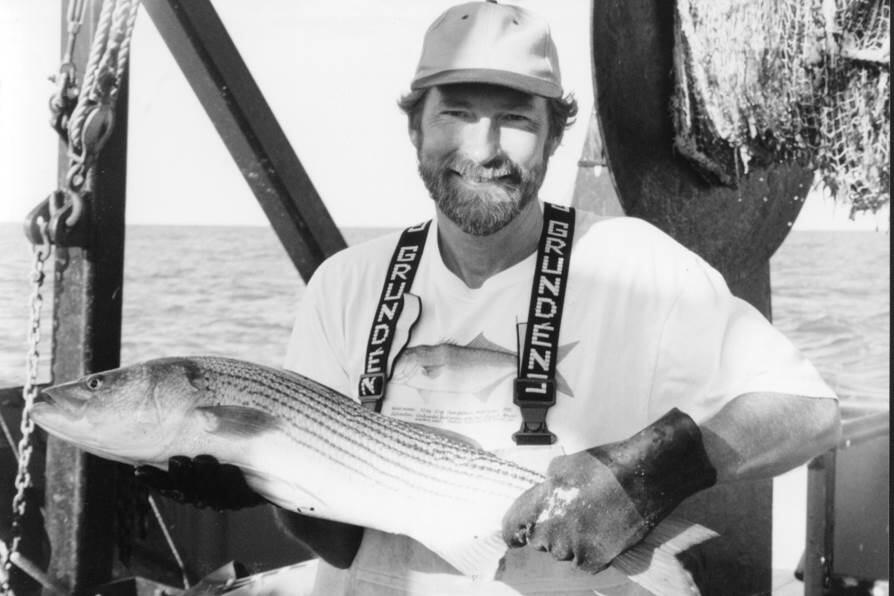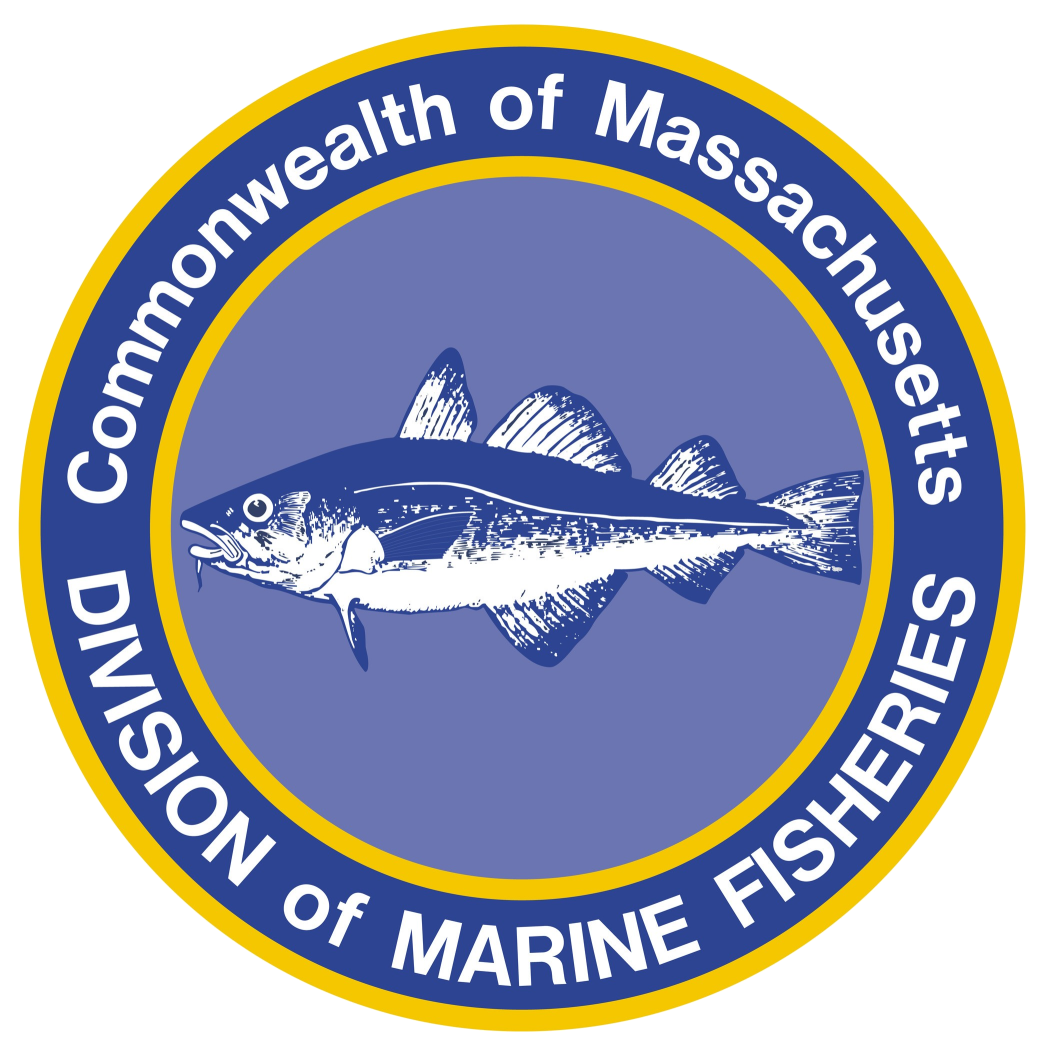- Division of Marine Fisheries

On November 1, Dr. David Pierce retired from DMF after 48 years of service. Renowned for his work ethic and attention to detail, David has been a pillar of Massachusetts fisheries management since the 1970s.
Over David’s career, fisheries management has evolved to become an intense and complicated process. With the passage of the famous Magnuson-Stevens Act in 1976, the federal regional fishery councils were born and management of the domestic fleets became a full-time job for many. Then-Director Allen Peterson recruited David to come to Boston to assist him with the growing workload created by the New England Fishery Management Council and the next Director Phil Coates relied on him as well.
Meanwhile, the Atlantic States Marine Fisheries Commission (ASMFC) was dealing with a growing number of nearshore stocks that needed coordinated state management due to their migratory nature. Many of these stocks became co-managed with the Mid-Atlantic Fishery Management Council. With the proliferation of interjurisdictional fishery management challenges, David found his niche as a front-line, tip of the spear professional fisheries manager. Just about every cutting edge management initiative that DMF was involved in has his fingerprints on it.
David’s influence in the management scene grew with the progression of management. Fisheries that were largely unmanaged in the 1970s became intensely scrutinized in the following decades. Multispecies groundfish (cod, haddock, and flounders), sea herring, scup, black sea bass, fluke, tautog, and spiny dogfish all required increasingly close attention and David was instrumental in overseeing the management of these species for the Commonwealth.
By 2000, his duties would grow to include serving as both a New England Council member and ASMFC Board member. Because of this dual role, David often effectively crossed over between these management bodies and helped ensure the goals of each organization were being met while the result was seamless and consistent. Occasionally, however, he led efforts to pursue outcomes at ASMFC that differed from the federal counterparts (e.g., spiny dogfish trip limits and scup state-by-state quotas in the early 2000s) but in those instances, he brought forward a transparent and cogent argument supporting his cause.
David brought a dedication and passion to the management of any species that he was assigned. He had a reputation for being prepared for all meetings. Even on those occasions when he failed to get a second to his well-crafted motion, he always maintained his professionalism and never held a grudge.
He sounded alarms about the direction of groundfish management and the negative outcomes of permit consolidation and lack of enforcement and accountability that has plagued the fisheries in New England. For many years he has also served as an adjunct professor at the University of Massachusetts–Dartmouth, teaching and mentoring graduate students in fisheries policy, helping to create the next generation of managers.
Back in Massachusetts, David was instrumental in state waters fisheries initiatives, where his diplomatic skills have served him well. In the early years of his career, his work often featured intense negotiations among competing user groups, such as draggers and trap fishermen, resulting in reasonable compromises. More recently, he has been a key player for the Baker administration dealing with the upcoming impacts of offshore wind development on the fishing industry—a complex and controversial challenge that has many fishermen fearing for their futures. He is also firm in his convictions when needed. Since being appointed Director in 2015, he demonstrated a strong conservation ethic in his aggressive conservation of state waters whelk fisheries, protections of right whale aggregations in state waters, and regulation of the state waters squid fishery.
David’s persistence, optimism, and attention to detail have served the citizens of the Commonwealth well and he will be missed. We wish him a long and healthy retirement.
Farewell from David!
Having spent 48 years with the Division with about 4 and a half as the agency’s Director and 15 as a Deputy Director, I acquired a first-hand, up-close understanding and appreciation of DMF’s talented and dedicated staff. I’ve witnessed staff evolution with all becoming adept at handling agency administration and fisheries management and science issues—many of which require great patience and resolve.
No Director should be an island making decisions without staff advice and analyses. In almost every instance during my career, when having to make those decisions, I’ve been supported—and often corrected—by that staff proving that a leader must be open-minded and willing to see all sides of an argument. This has been especially important for leading DMF and for management and regulation of the Commonwealth’s extremely valuable and complicated recreational and commercial marine fisheries.
I also benefited from the nine-person Marine Fisheries Advisory Commission considering my recommendations for decisions to improve fisheries management and to support actions by the New England Fishery Management Council and the Atlantic States Marine Fisheries Commission. I give much credit to Commission members for their voluntary service and sound advice.
During my time as Director, I witnessed DMF’s move to our new location in New Bedford alongside UMass Dartmouth’s School for Marine Science & Technology (SMAST) as part of my continuation of and support for the Commonwealth’s Marine Fisheries Institute. DMF is also a staunch supporter of the New Bedford Fishing Heritage Center, and the work it does to recognize fishing industry contributions to the Commonwealth’s economy and culture. The hard-working men and women, past and present, who comprised and still persevere to promote and sustain our diverse fishing industry must never be forgotten and their contributions and sacrifices always recognized.
I’ve also witnessed and been involved in DMF’s many contributions to offshore wind energy development, right whale protection, white shark research, shellfish aquaculture, anadromous fish restoration, striped bass conservation, and improving our understanding and reacting to the plight of Gulf of Maine cod likely tied to ocean warming and worsening climate change (among many other things). My plate always was filled with challenging ocean policy and science issues making my many years with DMF well-worthwhile, engaging, character-building, and often heart-pounding (fortunately, not stopping, although sometimes close).
I leave DMF in the capable hands of staff being supported by Department of Fish and Game leadership and the Executive Office and Energy and Environmental Affairs. I’m gratified that the next DMF Director will have the agency’s 2019–2023 Strategic Plan to enable DMF to achieve its vision and accomplish its mission.
Although I am retired and one would think I’d distance myself from the intrigue, glamor, and sometimes craziness of marine fisheries management and science to devote myself to other interests such as my ministry as a Permanent Deacon of the Catholic Church, I just cannot let go entirely. I will continue to teach a course on ocean policy to graduate students as an adjunct professor at SMAST. Helping young men and women appreciate what their careers will entail and the challenges they must face continues to be very rewarding and a give-back to those who eventually will assume leadership roles in a field of endeavor I’ve come to love and respect.
By David E. Pierce, PhD, Former Director
